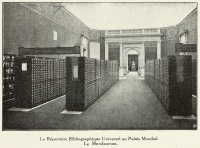Mundaneum
From The Art and Popular Culture Encyclopedia

|
Related e |
|
Featured: |
The Mundaneum was created in 1910 out of the initiative of two Belgian lawyers. Paul Otlet and Henri La Fontaine aimed to gather together all the world's knowledge and classify it according to a system they developed called the Universal Decimal Classification. Otlet and La Fontaine organized an International Conference of International Associations which caused the creation of the Union of International Associations (UIA).
Otlet regarded the project as the centerpiece of a new 'world city' - a centrepiece which eventually became an archive with more than 12 million index cards and documents. Some consider it a forerunner of the internet (or, perhaps more appropriately, of Wikipedia) and Otlet himself had dreams that one day, somehow, all the information he collected could be accessed by people from the comfort of their own homes.
The Mundaneum was originally housed at the Palais du Cinquantenaire in Brussels (Belgium). The Mundaneum has since been relocated to a converted 1930s department store in Mons (Wallonia).
See also
- Documentation science
- As We May Think, an essay by Vannevar Bush
- Project Xanadu, the first hypertext system, founded in 1960 by Ted Nelson
- Memex, a portmanteau given by Vannevar Bush to the theoretical proto-hypertext computer system
- MyLifeBits
- People
- Andries van Dam
- Douglas Engelbart
- J.C.R. Licklider
- Ted Nelson
- Paul Otlet, considered one of the fathers of information science, helped established the Mundaneum and created the Universal Decimal Classification
- Tim Berners-Lee
- Vannevar Bush
- Ideas
- External memory
- Hypermedia
- Hypertext
- Intelligence amplification
- Office of the future
- Victorian Internet, term coined to describe advanced 19th century telecommunications technologies such as the telegraph
- World Wide Web

